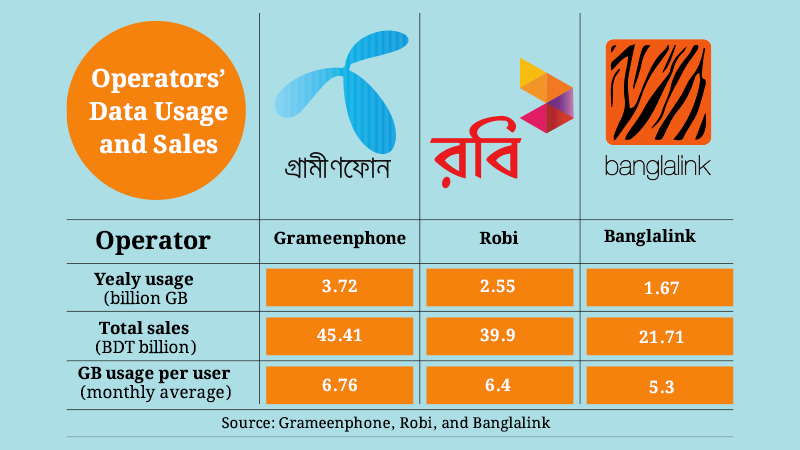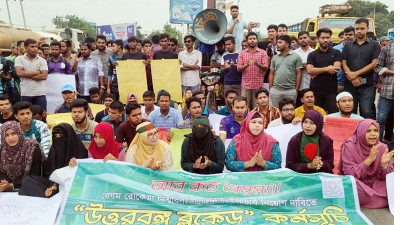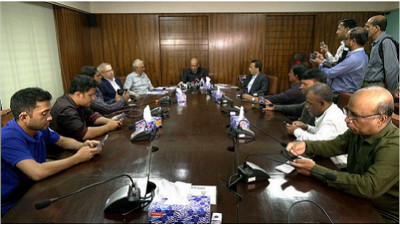 Photo: Bonik Barta
Photo: Bonik Barta The mobile
operators like Grameenphone, Robi, and Banglalink have seen significant
business growth through mobile internet data sales. Over the past few years,
these companies have reaped considerable profits from this sector. An analysis
of their financial reports shows that the cost of providing one gigabyte of
mobile internet data ranges from BDT 2.25 to BDT 5.25, with an average of about
BDT 4. Grameenphone’s cost per gigabyte is BDT 2.26, while Robi Axiata’s cost
is BDT 5.28. Although Banglalink’s financial report does not provide detailed
information on data costs, industry insiders say its cost per gigabyte is
similar to Robi’s.
However,
the operators claim that the actual cost of providing mobile internet data is
higher than the reported average of BDT 4. They argue that factors like
regulatory fees, VAT, taxes paid to the government, spectrum purchase costs,
service sales, marketing, advertising, revenue sharing with BTRC, and
contributions to the social responsibility fund add to the total cost of
providing internet services.
In
recent years, the price of bandwidth purchased from International Internet
Gateways (IIG) has decreased consistently, contributing to the expansion of
internet services in the country. As data usage has increased, so has the
number of broadband customers using services provided by various ISPs. Despite
this, the majority of users still rely on mobile operators for internet access.
The introduction of 4G technology has allowed operators to further expand
data-based services. However, customers have raised concerns about being
deprived and overcharged.
An
analysis of Grameenphone’s 2023 financial report reveals that the company
incurs seven types of expenses in managing its network. These include traffic
charges, costs related to parts and services, salaries, service management,
vehicle management, other operations and management, and fuel expenses. These
are primarily linked to internet management. The total cost of these seven
types of expenses amounts to BDT 31.04 billion.
Of
this, traffic charges account for BDT 8.3 billion, parts and services cost BDT
1.66 billion, salaries amount to BDT 8.49 billion, service management expenses
total BDT 2.99 billion, vehicle management costs BDT 321 million, other
operations and management amount to BDT 2.96 billion, and fuel costs reach BDT
6.31 billion.
Over
the year, Grameenphone’s subscription and traffic revenue amounted to BDT
156.33 billion. Revenue derived from voice, data, and messaging services, was
collected from its customers. In comparison, the company’s total expenses were
BDT 31.04 billion. Of the BDT 156.33 billion, data sales generated BDT 45.41
billion, while non-data revenue amounted to BDT 110.92 billion.
Data
revenue accounts for 30.21 percent of the company’s total earnings. Out of BDT
31.04 billion, which is the company’s total expenses, 29 percent or BDT 9.31
billion is spent on data services.
According
to operator sources, Grameenphone currently has 46.6 million data users. Each
customer, on an average, uses 7.4 GB of internet data per month. Annually,
Grameenphone users consume 4.14 billion GB of internet data. The price per
gigabyte of data is BDT 2.26.
Cellular
operators purchase bandwidth from International Internet Gateway (IIG)
providers at a rate of BDT 130 to 150 per megabit per second (Mbps). These
companies primarily buy speed from IIGs, selling it to customers as capacity.
At a speed of 1 Mbps, the maximum amount of data used in a month is 2,592
gigabytes (GB). Based on this, the cost to operators per GB of data is BDT
0.05-0.06. However, accounting for a 30 percent loss due to disconnection and
other factors, the actual data usage comes to 1,814 GB. Thus, the cost to operators
for each GB of data ranges from a minimum of BDT 0.07 to a maximum of BDT 0.09.
Additional operational costs are also factored in. A financial analysis of Robi
Axiata Limited, another mobile operator, reveals a similar expense pattern. The
company spent BDT 2.65 billion on equipment and services, BDT 4.85 billion on
interconnection and roaming charges, BDT 17.87 billion on network operations
and maintenance, BDT 4.53 billion on salaries and benefits, BDT 226.5 million
on vehicle management, BDT 1.03 billion on software and hardware maintenance,
and BDT 13.6 million on building management. In total, Robi spent BDT 31.17
billion on direct services.
In
2023, Robi earned BDT 92.17 billion from its customers, including BDT 39.90
billion from data revenue. The remaining BDT 52.27 billion came from non-data
services such as voice calls, messaging, and other offerings.
The
analysis shows that 43.28 percent of the company’s total revenue is from
data-based services. Out of the BDT 31.17 billion spent, BDT 13.49 billion was
on data services. During the year, Robi provided customers with 2.55 billion GB
of data, resulting in a direct cost of BDT 5.28 per GB.
Additionally,
these two companies incur significant expenses in other areas, with a large
portion going to the government. This includes a 20 percent supplementary duty,
a tax of BDT 300 per SIM card, 45 percent corporate tax, and a 5 percent duty
on telecom product imports.
Moreover,
operators must acquire spectrum from the Bangladesh Telecommunication
Regulatory Commission (BTRC). In the last auction held on March 31, 2022, BTRC
allocated spectrum worth BDT 106.45 billion. Such spectrum allocations are
considered a major source of government revenue. Additionally, mobile operators
are required to pay regulatory fees to BTRC and contribute to the Social
Obligation Fund (SOF).
In
2023, Banglalink’s digital communication revenue from data and non-data sectors
totaled BDT 60.54 billion, with data revenue amounting to BDT 21.71 billion.
Non-data revenue was BDT 38.83 billion. The operator currently has 26.2 million
data users and sold 1.67 billion GB of data to customers this year.
When
asked about costs and internet pricing, Shamim Ahamed, Media and Communication
Manager of Robi Axiata Limited, told Bonik Barta, “Robi will not comment on
such irrational questions.” Grameenphone also declined to comment on the
matter.
When
asked about the difference between the cost per gigabyte of data and the
selling price by cellphone operators, Professor Dr. BM Mainul Hossain of the Institute
of Information Technology at Dhaka University told Bonik Barta, “We must bring
these issues under accountability. Operators should charge customers in line
with their expenses for data provision. But it should be at a reasonable level.
They must disclose the relevant information to the public. Investors are
running businesses, but why should there be secrecy? Operators must disclose
their cost information. We have a regulatory body, and they need to clarify the
situation to the regulators, including how much the costs are and how they are
incurred. If necessary, the regulatory body will set the prices.”
In
the past year, customers have reduced their use of cellphone talk time.
Industry insiders say that people are now easily communicating through data-based
apps like Messenger, WhatsApp, Skype, Imo, Zoom, Meet, and LinkedIn. These apps
allow easy texting, voice calling, and sharing of photos and videos. These
encrypted apps are also cost-effective. As a result, users are prioritizing
them over talk time and SMS.
Asked
for his opinion, Fahim Mashroor, CEO and founder of BDjobs.com and an
information technology expert, told Bonik Barta, “We have already discussed
mobile internet data pricing. We’ve submitted an informal proposal to the
ministry. We are discussing how to restructure this sector better. Companies
are setting high prices to collect additional profits. These prices must be
lowered.”
He
added, “Operators focus more on cities but ignore villages. As a result, 4G
services in rural areas are inadequate, leading to a large amount of unused
data by the operators. The cost of this unused data is passed on to the
customers.”
According
to data from the Bangladesh Telecommunication Regulatory Commission (BTRC),
operators sold 155.33 billion ‘on-net call minutes’ through their own networks
in the 2022-23 fiscal year. The previous year, the figure was 163.74 billion
minutes. This indicates that telecom operators sold 8.41 billion more minutes
in the 2021-22 fiscal year. In the 2020-21 fiscal year, customers used 167.99
billion minutes of talk time. This shows a decrease of 4.24 billion minutes in
2021-22 compared to 2020-21.
Similarly,
the use of SMS has also dropped. In the 2022-23 fiscal year, customers sent
18.91 billion SMS domestically, compared to 25.99 billion the previous year.
This indicates a reduction of 7.09 billion SMS. In 2020-21, customers exchanged
30.39 billion SMS, which was 4.40 billion more than the following year.
In
contrast, internet users have increased over these three fiscal years. In the
2022-23 fiscal year, there were 129.4 million internet users in the country, up
from 126.2 million in 2021-22 and 120.9 million in 2020-21.
When
asked about the overall situation, Nahid Islam, the Interim Government’s
Adviser on Posts, Telecommunications, and Information Technology, told Bonik
Barta, “Discussions about telecom operators’ data and talk time prices have
been ongoing for a long time. Our general customers are also frustrated with
the high internet prices. We will soon begin working on determining a
reasonable price for the internet.”






